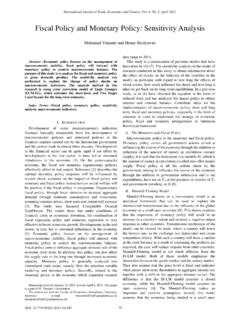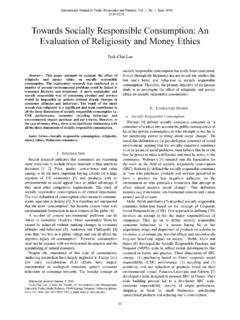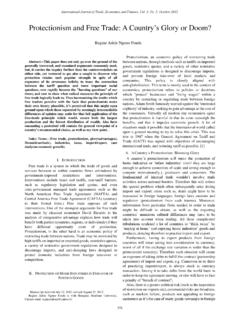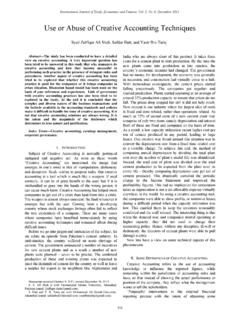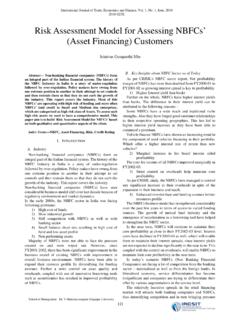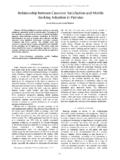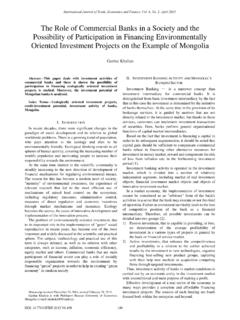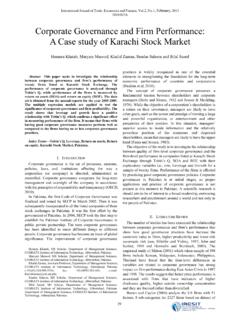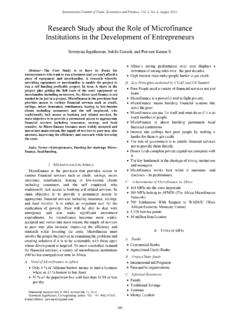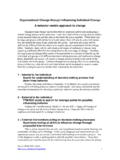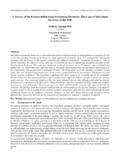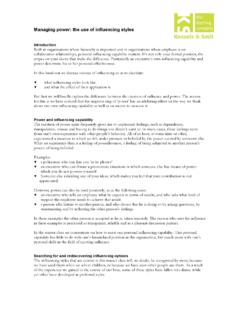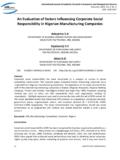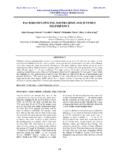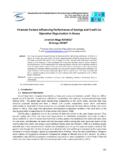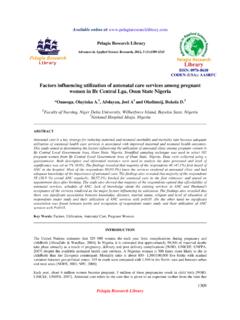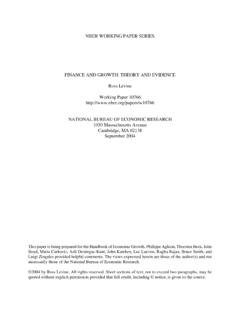Transcription of Factors Influencing Activity-Based Costing Success: …
1 International Journal of Trade, Economics and Finance, Vol. 1, No. 2, August, 2010 2010-023X 144 Abstract In today s advanced manufacturing and competitive environment, accurate Costing information is crucial for all the kinds of businesses, such as manufacturing firms, merchandizing firms, and service firms. Argued to be superior to the traditional volume- based Costing system, Activity-Based Costing system (ABC) has increasingly attracted the attention of practitioners and researchers alike as one of the strategic tools to aid managers for better decision making. The benefits of ABC system and its impacts on companies performance have motivated numerous empirical studies on ABC system and it is considered as one of the most-researched management accounting areas in developed countries. Previous research on ABC have examined pertinent issues related to ABC implementation such as the levels of ABC adoption in various countries, the reasons for implementing ABC, the problems related to ABC and the critical success Factors Influencing ABC.
2 This paper reviews the research on ABC carried out within the last decade, from 1995-2008, and from the review research gaps are identified. Specifically, this paper examines the selection of Factors Influencing successful ABC implementation, variables used by previous research and the definitions and operationalization of the variables. The review reveals that past research concentrated mainly on behavioral, organizational, and technical variables as the main determinants of ABC success but very little research have been done to examine the roles of organizational culture and structure. based on the research gaps identified, a research framework for future research is provided. Index Terms Advanced Manufacturing Environment, Activity-Based Costing , ABC success I. INTRODUCTION In today s competitive and continually changing business environment, firms need to be vigilant of the impacts of the changes in the business environment and devise appropriate strategies to survive and prosper.
3 Advancements in manufacturing and communication technologies have drastically changed the ways businesses conduct their activities. Adoption of advanced manufacturing technologies such as robotics and computerized manufacturing have resulted in significant changes in the manufacturing cost structure which have led academics and practitioners to argue that the traditional Costing methods are no longer sufficient within this new manufacturing environment [1] (Johnson and Kaplan, 1987). This had resulted in the change from the traditional volume- based cost model to new Costing methods such as activity based Costing (ABC) [2]. Due to its ability in providing more accurate Costing information and enhancing firms performance, ABC is becoming more and more popular [3-7] ABC aims to provide accurate Costing information to managers to allocate activity costs to products and services by applying cost drivers [8].
4 Academics who advocate ABC, such as, Cooper and Kaplan [9], and Swenson [10] argue that it provides more accurate cost data needed to make appropriate strategic decisions about product mix, sourcing, pricing, process improvement, and evaluation of business process performance. These claims have led many firms to adopt ABC systems [8]. The benefits of ABC and its positive impact on firm s performance motivated a numerous studies which examined various aspects of ABC. Among such studies are McGowan [11] who assessed the integrity of ABC success , Innes and Mitchell [4, 12] and Yanren [13] who conducted research on Factors affecting ABC adoption, and Shield [3], Shields and McEwen [14], Gosselin [15] and Baired et al.[16, 17]who concentrated on Factors Influencing ABC success especially at the implementation stage. However, there is mounting evidence that suggests most of firms are experiencing problems in implementing ABC and, in some extreme cases, ABC implementation is not successful [3], which later resulted in abandoning the ABC systems altogether [15].
5 Questions arise as to why ABC implementation is successful in certain companies and fails in others. based on the contingency theory, researchers have argued that the reasons for different degrees of ABC success could be due to the different contextual Factors faced by each firm. These have led researchers to recognize assessing Factors that influence ABC success implementation as an important research area. The following are among the research that have been carried out to examine Factors that influence ABC success : Anderson [18]; Shield [3]; McGowan and Klammer [19]; Krumwiede [20]; and Anderson and Young [21] This article has two main objectives; the first objective is to identify research gaps based on the revision of previous research and the second objective is to propose theoretical research framework for current research. This article is organized as follows: Section II presents a discussion of selected articles related to Factors Influencing ABC implementation and gaps or limitations of previous studies and suggestions for current research are stated in the section III and IV.
6 The framework for current research is provided in section V, Section VI defines each research variable and the final section presents the conclusion. II. PREVIOUS RESEARCH In this section, selected ABC implementation empirical Factors Influencing Activity-Based Costing success : A Research Framework Zhang Yi Fei and Che Ruhana Isa International Journal of Trade, Economics and Finance, Vol. 1, No. 2, August, 2010 2010-023X 145studies, which spanned 1995-2008 periods, were collected from four prominent refereed accounting research journals, in management accounting field: Journal of Management Accounting Research, Accounting, Organizations and Society, Management Accounting Research and British Accounting Review. Factors used by previous research to investigate the effect on ABC success implementation are summarized, and stage of ABC implementation also is outlined.
7 A. Technical Variables Early studies of ABC adoption and implementation undertaken by previous researchers concentrated on technical Factors , such as identification of main activities, selection of cost drivers, problem in accumulating cost data. Example of these research are Cooper [9], Morrow and Connelly [22]. However, technical Factors alone may not be adequate to explain the Factors Influencing ABC success implementation. Cooper et al. [23] argued that the key problem during ABC implementation stage is that companies only focus on technical Factors . They suggested that to make ABC implementation more effective, non-technical Factors such as involvement of non-accounting in ABC implementation process, top management championship, adequate training program to employees about the objectives and benefits of ABC should be emphasized as well.
8 Similar opinions were expressed by Shield [3] and Shields and McEwen [14]. Shield (1995) found no significant relationship between technical Factors and ABC success . Shields and McEwen [14] also highlighted that sole emphasis on the architectural and software design of ABC systems leads to the failure of ABC implementation. Therefore many researchers have suggested that new variables should be considered to investigate Factors Influencing ABC success . B. Contextual, Behavioral and Organizational Variables Recognizing the research gaps in identifying Factors that may affect ABC success , academicians shifted their focuses from technical Factors to other variables, such as contextual, behavioral and organizational, culture, as well as organizational structure. Anderson [18] conducted a longitudinal investigation of ABC process in General Motor (GM) from a period of 1986 to 1993.
9 In his research, he examined the effects of organizational variables and contextual variables, and segmented ABC implementation into four major stages, initiation, adoption, adaptation and acceptance. He found that organizational Factors , such as top management support and training for the ABC system affected various stages of ABC significantly, while contextual variables, such as competition, relevance to managers decisions and compatibility with existing systems produced different degree of impact on different stages of ABC. Shield [3] examined the relationships between diversity of behavioral, organizational and technical Factors and the success of ABC implementation. She employed Shield and Young s [24] framework and summarized behavioral and organizational variables as top management support, adequate resources, training, link ABC system to performance evaluation and compensation, non-accounting ownership, link ABC to competitive strategies as well as clarity of ABC objectives.
10 She found that top management support, linkage to quality initiatives and to personal performance measure (pay/appraisal), implementation of training and resource adequacy were the significant predictors in explaining ABC success . She also found that technical variables were not associated with ABC success . Shield s findings are supported by other researchers, such as Shield and McEwen [14], who argued that a significant cause for unsuccessful implementations of ABC of several companies could be due to the emphasis of architectural and software design of the ABC system and less attention given to behavioral and organizational issues, which were identified by Shield [3]. Krumwiede and Roth [25] also stated that barriers of ABC implementation can be overcome if firms could give importance to behavioral and organizational variables identified by Shield [3].
